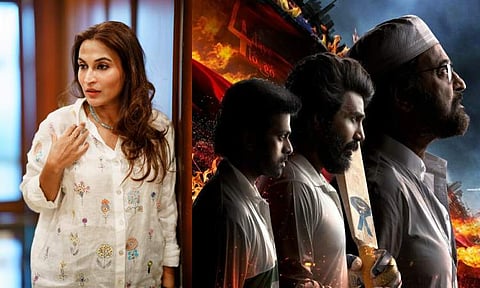

The famous adage from Paulo Coelo’s novel, The Alchemist, goes, “When you want something, all the universe conspires in helping you to achieve it.” However, it is safe to say that the inverse too, is a possibility. For Aishwarya Rajinikanth, awaiting the release of her upcoming sports drama Lal Salaam, working with her father was not her first choice—as hard as it may be to believe. “I didn’t want to work with him. Even during the release of 3 in 2012, I was asked if we would collaborate on a project, and I had the same answer then too. Sometimes, a film somehow finds its missing piece. I believe in positive vibrations. When a script projects a strong idea and opinion, it attracts what it needs. I feel that my dad and everyone else in the cast and crew got into the project only this way,” she explains.
Lal Salaam stars Vishnu Vishal and Vikranth in lead roles, while Rajinikanth will be seen in an extended cameo role as Moideen Bhai. On the political undertones of the film, Aishwarya shares, “I feel that if you are a citizen of the country with an Aadhar card, you will have a role to play in politics. Lal Salaam speaks about the politics of people and does not emphasize politics as an entity unto itself.” Recalling how the film came into being, Aishwarya Rajinikanth says, “Scriptwriter and cinematographer Vishnu Rangasamy narrated two scripts to me. One was a commercial love story and the second was this. This was more challenging as this is not my zone and taking this up felt meaningful.”
Lal Salaam marks Aishwarya’s return as a director after seven years following Gautham Karthik’s Vai Raja Vai in 2017. “A fish doesn’t need time to swim. It is always comfortable in its environment. The question here is whether I wanted to be in a tank or swim free,” she says.
The sports drama narrates the story of two rival cricket teams and the ripple effect that it creates on friendship and family, and the village. There are enough strong emotions in the film, as hinted by Aishwarya’s speech at the audio launch, where she spoke against those who criticised her father’s political alignment. Reacting to the controversy that followed, she maintains, “I had registered my opinion following which the press had confronted him at the airport and asked him his response about the same. He has also aptly responded to the queries. After all this, I feel that my statement warrants no further explanation.”
Aishwarya believes that this film will promote a message that is the need of the hour. “The film has a bold message that needs to reach everyone. When I was working across south Tamil Nadu, I understood that the people resonated with this message, but weren’t willing to convey it openly. If they are able to do so after watching my film, I would be happy.”
In Rajinikanth’s five-decade-long career, this will be the first time that the audience will see him play a Muslim character. “There is a reason he plays this particular character who holds strong beliefs and principles. He trusts that when he says something, the idea reaches far and wide,” she elaborates. “He is a dedicated actor, and I can’t stress this enough. Every day for everyone, working with him was like attending a masterclass.”
Using artificial intelligence, composer AR Rahman has ventured into uncharted territories by recreating the voices of two deceased singers – Bamba Bakya and Shahul Hameed – for the film, a move that was also received with considerable criticism. Aishwarya notes that the composer is open to new developments in technology while evolving every day. “We wanted an earthy, folk voice and these vocalists had it in them. He wanted to test this, and it worked. He was very ethical in the way he approached the process and ensured their permission was taken and they were compensated monetarily for it, setting an example that AI can be used in a positive way,” she articulates.
With much debate regarding the film’s politics, she clarifies, “Lal Salaam is not against any ideology. You will know when you watch the film. There was no requirement for us to defend or oppose the story of the film. The story will be the hero for my film.”